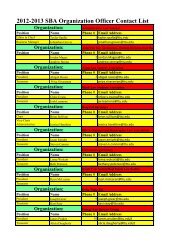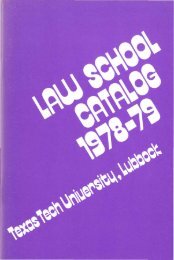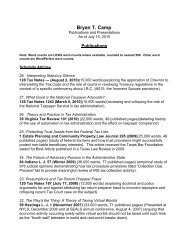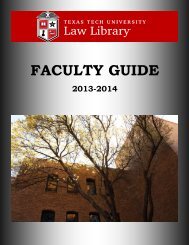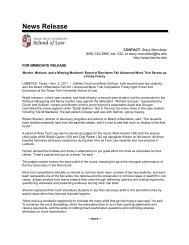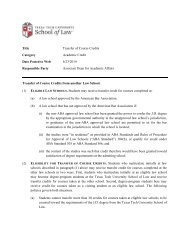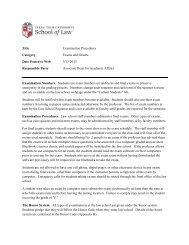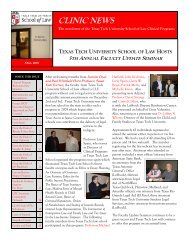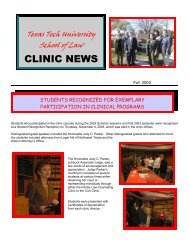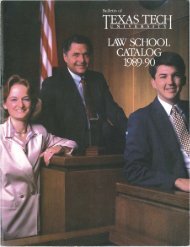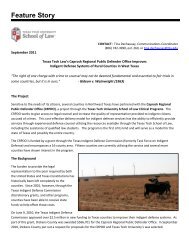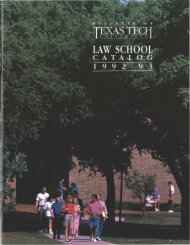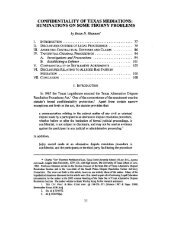1998-1999_Law School Catalog.pdf - The Texas Tech University ...
1998-1999_Law School Catalog.pdf - The Texas Tech University ...
1998-1999_Law School Catalog.pdf - The Texas Tech University ...
- No tags were found...
Create successful ePaper yourself
Turn your PDF publications into a flip-book with our unique Google optimized e-Paper software.
22 23ment upon an applicanYs potential for studying lawbased on personal knowledge. <strong>The</strong> AdmissionsCommittee asks that applicants send no more thanthree recommendation letters. <strong>The</strong>y arc not influencedby the number of letters but by the quality ofthe letters.When to ApplyApplication may be made after the applicant hasearned 90 hours of undergraduate credit but allwork toward the baccalaureate degree must becompleted before enrolling in the <strong>School</strong> of <strong>Law</strong>.Candidates should not delay filing an application inorder to include later grades. An updated transcriptmay be submitted to LSDAS at any time and thecumulative grade-point average will be recomputedto reflect the additional grades.For consideration for fall, applicants are advisedto complete application by February. Four to sixweeks are normally required for processing theLSAT score and the LSDAS grade analysis.Applicants should be alert to the system ofacknowledgments used by the <strong>Texas</strong> <strong>Tech</strong> <strong>School</strong> of<strong>Law</strong> and by the <strong>Law</strong> <strong>School</strong> Admission Servi"" toinform them of receipt of application materials.LSAS sends an acknowledgment to the applicantupon receipt of the applicant's college transcripts.Since the LSDAS reports cannot be completed andsent to the law school until all transcripts requestedhave been received and evaluated, inquiries shouldbe made to LSAS (215/968-1001) if acknowledgmentsare not received within a reasonable time.<strong>The</strong> admissions staff of the <strong>Law</strong> <strong>School</strong> acknowledgesreceipt of the application and again informsthe applicant when the application is completedwith an LSDAS report.Applications are considered for the current yearfall enrollment only.Application Procedure for ForeignStudentsIn addition to completing the application foradmission, each applicant must also register for andtake the <strong>Law</strong> <strong>School</strong> Admissions Test. <strong>The</strong> <strong>Texas</strong><strong>Tech</strong> <strong>School</strong> of <strong>Law</strong> must receive official copies ofthe applicant's transcript(s) from the undergraduateschool. Each transcript must have a notation on itshowing that adegree was awarded. Upon receiptof the transcript, we will send acopy of it to anofficial of our university who will determinewhether the degree received from the foreignuniversity is the equivalent of an undergraduatedegree from an accredited university in the U.s. Assoon as this determination is made, the applicantwill be notified. An official Test of English as aForeign Language (TOEFL) score report showingproficiency in English must also be submitted priorto admission. <strong>The</strong> applicant must score at least 550on the TOEFL.AdMissions Process<strong>Texas</strong> <strong>Tech</strong> <strong>Law</strong> <strong>School</strong> operates an early actionadmissions policy. Applications meeting the earlyaction admissions criteria and received after theSeptember 1starting date are reviewed whencomplete and acceptance decisions are made within3 weeks. Other application decisions are deferreduntil after February 2. During February, March, andApril the committee reviews these files and makesacceptance decisions. Applicants are notified asthese decisions are made by the committee.When the committee believes sufficient acceptanceshave been received to complete the enteringclass, those applicants not selected will be notified.Asmall group of applicants may be asked if theywish to be placed on awaiting list if openings occur.Applicants are encouraged to apply as early aspossible to insure their files are complete and readyfor consideration by the committee early in thedecision-making process.Applicants applying after February 2will beconsidered for admission but should understandthat their chances of selection are somewhatdiminished. Late files will be fully considered afterthe regular applicant pool is reviewed.While considerable weight is placed on theapplicant's LSAT score and grade-point average, inmaking its admissions decisions, the committeelooks beyond the quantitative data to such factorsas background, experience, extracurricular activitiesand interests, and evidence of leadership qualities.• DepositEach accepted applicant is required to pay a $200deposit to hold a place in the entering class. Thisacceptance deposit will be refunded to the applicantupon matriculation at the <strong>Law</strong> <strong>School</strong>. One-hall ofthe deposit is refundable upon timely written notice ofachange in plans. Such notice is due May 1for falladmission. Applicants who fail to submit the $200acceptance deposit by the date specified in theacceptance letter will forfeit their place in theentering class.Application Evaluation<strong>The</strong> <strong>Law</strong> <strong>School</strong> Admission Test score and thecumulative grade-point average are equaUy importantin determining admission. However, theAdmissions Committee also considers several otherfactors when evaluating the LSAT score, the GPA,and the qualitative elements bearing on admissionsdecisions.• Undergraduate GradesWhile the cumulative GPA is used to categorizethe application on review, the progression (orregression) of grades over the fOUf years is consideredin weighing the GPA. Thus, the student whosejunior and senior leveJ performance evidences highquality may compete favorably with other applicants.Also, the difficulty of the undergraduateacademic program is noted.• Graduate WorkGraduate transcripts submitted with theapplication are reviewed and, depending upon thequality of the work, may enhance the application. Itis recognized that applicants may have severalreasons for deciding to attend graduate school priorto applying for law school. li by taking a graduatedegree the applicant is attempting to show that amediocre undergraduate record is not truly representativeof his or her academic ability, it is essentialthat the graduate record demonstrate outstandingperformance. Graduate work is only one of thefactors considered in evaluating an application.Consequently, attending graduate school for thesole purpose of securing entrance to law school isnot recommended. In any event, if graduate workis being contemplated, the applicant should pursuea graduate course of study which will enhanceother career opportunities as well as his or her lawschool application.• Repeat LSAT Scores<strong>The</strong> LSAT may be retaken. In deciding whetherto retake the LSAT, the applicant should considerwhether some element such as illness reduced his orher ability to perform up to potential on the test andwhether the score is reasonably comparable to pastperformances on other standardized tests. <strong>The</strong>second test score is averaged with the first score. Itshould be noted that while it is common for theapplicant to improve the !.SAT score on retake, alesser score on the second test is not rare. Consequently,there is some risk in the retake.• Work and Military ExperienceEmployment or military assignments, particularlythose experiences evidencing maturity orproviding a background which could be helpful to alawyer, are considered in the application review.• Writing Sample<strong>The</strong> LSAT writing sample is considered by theAdmissions Committee.• Other FadorsIn addition, the Admissions Committee willconsider the following factors: the socioeconomicbackground of the applicant, including the percentageby which the applicant's family is above or belowany recognized measure of poverty, the appli-eant'shousehold income, and the applicant's parents'level of education; whether the applicant would bethe first generation of the applicant's family toattend or graduate from an institution; whether theapplicant has bilingual proficiency; the applicant'sresponsibilities while previously attending school,including whether the applicant has been employed,whether the applicant has helped to raise children,or similar factors; the applicant's region of residence;whether the applicant is a resident of a rural or urbanarea or a resident of acentral city or suburban areain the state; the applicant's performance on theLSAT in comparison with that of other students fromsimilar socioeconomic backgrounds; the applicant'sinvolvement in community activities; the applicant'sextracurricular activities; the applicant's admissionto a comparable accredited out-of-state institution;and any other consideration the <strong>School</strong> of <strong>Law</strong>deems necessary to accomplish its stated mission.• New InformationAny time an applicant provides the law schoolwith new information regarding questions 11-15 on



